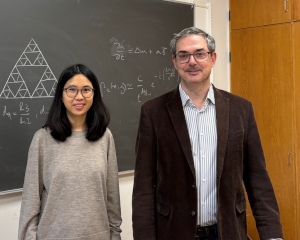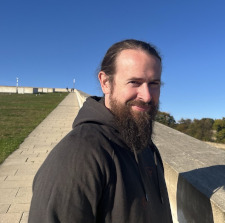Li Chen og Fabrice Baudoin samt Greg Stevenson modtager bevilling fra Danmarks Frie Forskningsfond
Li and Fabrice's project, “Parabolic Anderson Models on Fractals”, as well as Greg's project, “New Frontiers in Condensed Mathematics”, stand out for their quality and for advancing new knowledge.
Parabolic Anderson models on fractals

Fractals are geometric objects that are self-similar at all scales, and they are often used to model complex systems such as turbulence and porous media. In this project Li and Fabrice will develop a new theory which can be used to study stochastic partial differential equations in fractal spaces, and they will focus on the parabolic Anderson model which is a popular model in mathematical physics. Li and Fabrice’s research proposal consists of two independent but interconnected projects. In the project (SHE) they will study the continuum Parabolic Anderson model in fractal structures with a special emphasis on proving results about the free energy of the solution and its intermittent localisation properties. In the project (PAM) they will study the discrete Parabolic Anderson models on fractal graphs and prove related asymptotic universal limit laws. The grant will fund a PhD student.
New Frontiers in Condensed Mathematics

Condensed mathematics is a new and exciting subject which provides a robust framework in which one can effectively combine algebra with topology and analysis. In particular, it provides us with new derived categories of topological abelian groups which enjoy excellent homotopical properties. However, these categories are very large and are not yet well understood. Greg’s project is aimed at proving fundamental structural properties of these new categories, generalizing analogous results in the absence of a topology. Namely, Greg and his colleagues want to understand how to work locally with these objects and how to glue them together. They will also work on applying the new theory to open problems coming from representation theory. The grant funds a three-year postdoctoral position.
Independent Research Fund Denmark (DFF)
The grant received by Greg, as well as Li and Fabrice, is a DFF Research Project, which is a research grant from the Independent Research Fund Denmark (DFF) that supports high-quality, small-scale research projects. The grant is aimed at individual researchers or small research teams, with the goal of promoting new knowledge and groundbreaking research across all scientific fields.
